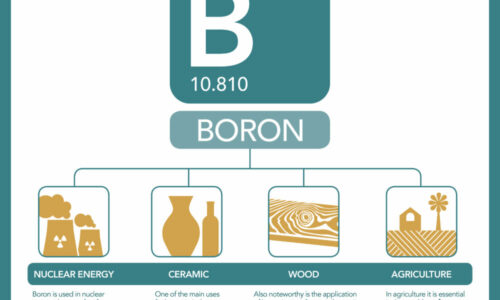Chernobyl, the hit mini series of the moment, has shone a spotlight on the protagonist of this new article in the series commemorating the International Year of the Periodic Table: boron (B). Because of its excellent capacity to absorb neutrons, boron is used in nuclear power plants to decelerate reactions. However, the boron control rods at Chernobyl contained graphite tips, a material that counteracts this effect. This design flaw was one of the many factors that caused the disastrous explosion that now has thousands of viewers glued to their screens.
Beyond nuclear power plants, “boron plays an important role in a multitude of economic sectors thanks to its multiple functions; as such, if boron didn’t exist, it would be very hard to replace”, states Carme Garcia, Business Development Manager of Agrochemicals for Grupo Barcelonesa. “For example, it is essential in crop micronutrients”, Garcia explains. “Despite being necessary in small quantities, boron deficiency occurs in many soil types, which is why in many parts of the world various boron-based products are applied to the soil in order to prevent deficiencies of this important nutrient”, adds the expert.
One of the main uses for boron in industry is the manufacture of glass and ceramics; the element reduces melting temperatures and increases resistance to thermal shock, among many other properties and benefits. It is also used in the metalworking industry to produce refined metals, in the electrochemical industry for electrolytic coatings and, in construction, for manufacturing flame retardant prefabricated materials or laminated plasterboards.
Also noteworthy is the application of boron in wood protection, as it is effective against fungi, wood rot, and xylophagous insects and, of course, for its proven capacity as a flame retardant. Even some medications for the eyes, ears, and poor foot odour contain boron for its mild anti-fungal and anti-bacterial properties, among other characteristics.The list of industries that use boron is long, as is the list of boron-containing items that we use on a daily basis. In addition to the previously mentioned sectors, we can also find uses for boron in industries for textiles, paper, cosmetics, water treatment, industrial fluids, cellulose insulation, solar panels refractory materials, drilling mud, paint and coatings…
The element isn’t very abundant in nature and “has never been found in its elemental form”, Carme García explains. “More than 200 minerals contain boron oxide (B2O3), but just four of them comprise about 90% of commercially used borates: Borax (Tincal), Colemanite, Kernite, and Ulexite”, adds the company spokeswoman.
Barcelonesa’s boron is sourced from the company Inkabor, who the group represents under an exclusive agreement in Spain and Portugal.


